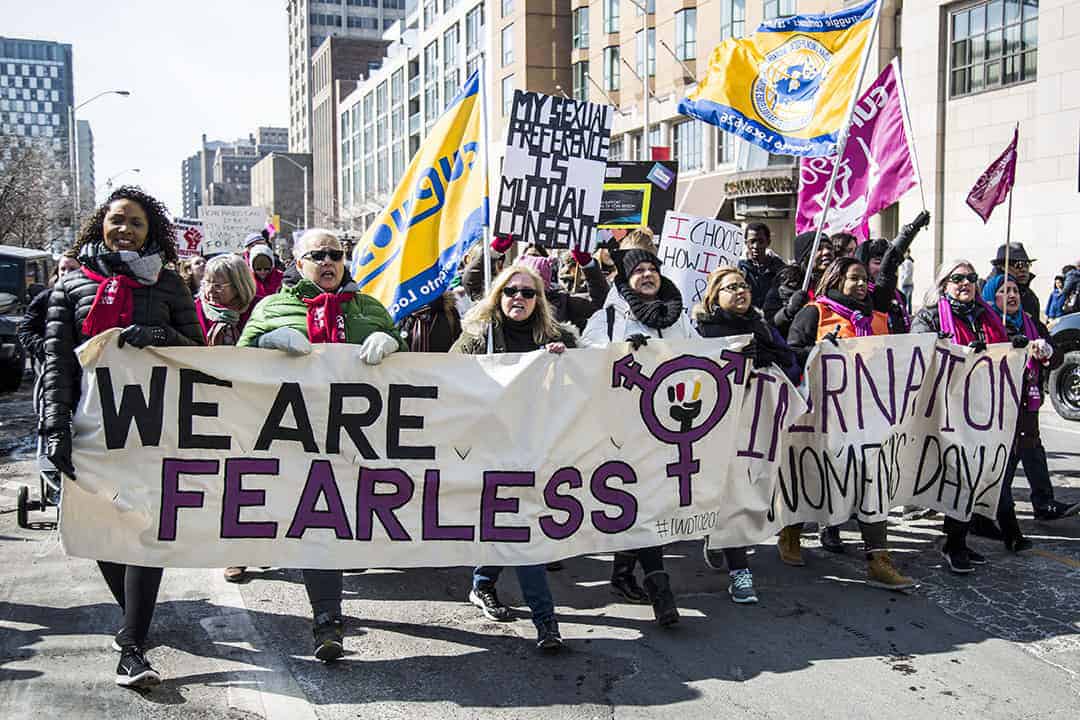Content warning: This article discusses misogyny and violence against women.
In honour of Women’s History Month coming to an end, I wanted to shed some light on the commercialization and liberalization of feminism in an attempt to redirect it toward a revolutionary movement seeking liberation, instead of what it currently seems to be.
Feminism often emphasizes empowerment and freedom of choice. While these are important, they are ultimately simplified ideas meant to sell a digestible image of a liberatory movement, in a way that effectively diminishes the subversive nature of feminism required for women’s liberation. This attempt to appeal to larger audiences hinders feminism’s ability to adequately address misogyny.
For instance, the popular slogan, “Feminism is the radical notion that women are human beings,” is questionable. Initially intended as a phrase meant to encourage equality between the genders, it is now sold in the form of notebooks and t-shirts — yet women remain oppressed.
I have not met many men who would sincerely contest this phrase. I have, however, put up with countless men who deny the presence of misogyny in contemporary society, whether it’s denying the fact that rape against women is not taken seriously or rejecting the fact that domestic violence against women turns fatal far too often.
The current commercialized framework is an easily digestible and marketable version of a movement intended to liberate a gender from oppression. It has become less about actively protesting harmful economic and social institutions — like rape, sex trafficking, the disproportionate number of women in poverty, continued unpaid domestic labour, violence against women in pornography, and disproportionate rates of intimate partner violence — and more about producing catchy slogans that can sell.
This commercialization has abandoned the movement for women’s freedom and moved toward performativity and profit. This, in turn, nurtures a culture where purchasing the product is enough to consider oneself subversive without lifting a finger. While some might argue that feminism selling is important because it garners attention for a necessary movement, I would argue that commodification is counterproductive, as it allows people to ‘purchase’ activism as opposed to actively dismantling patriarchal institutions.
Another issue with the current framework is that it is superficial; it fails to address the needs of women as a political class affected by the collection of institutions comprising the patriarchy. Many women have the ability to make choices for themselves. For instance, many women choose to work or be stay-at-home mothers. But the liberal feminist framework, which focuses on individual rights via legal and social policy, begins and ends at individual choice without seeing the bigger picture.
Liberal feminism doesn’t seem to understand why women would choose to be stay-at-home mothers. Instead, the framework glamourizes entering a workforce that undervalues women’s labour, requiring underpaid labour from women. Nor does it seem to question the societal factors that influence women to be stay-at-home parents more than men. They do not account for the fact that choices are not made independent of external forces but rather are made within overarching social structures with often negative effects for the ‘wrong’ choice.
For example, in a world where women are expected to consistently look young and ‘flawless,’ and are ridiculed for failing to do so, is the ‘choice’ to get plastic surgery or spend thousands of dollars on makeup really a choice? Is the ‘choice’ inherently feminist, simply because the woman made it herself, or is it just an easy way to sell products and delude consumers into feeling like they are still progressive?
There are no laws forcing women to wear makeup or get plastic surgery, so according to some narratives of liberal feminism, women are ‘free’ to make those choices themselves. However, is that really true? Do we really make free choices from these misogynistic expectations? This framework of feminism does not actually seek to destroy the patriarchy but rather aims to ease women’s consciences about participating in it.
The obsession with making feminism conform to a socially acceptable movement in a social culture where misogyny is the norm is antithetical to what we should be doing for change — identifying and destroying misogynistic institutions.
Firstly, in my opinion, feminists must reject the commercialized version of the movement and recognize that the term ‘patriarchy’ does not signify random idealized oppression. It is rather a word encompassing the many institutions promoting a higher spot for cisgender men in the gendered hierarchy. It manifests in and protects violence against women, including female genital mutilation, female foeticide, medical misogyny, child and forced marriage, femicide, and more. Feminism must have the clear objective of liberating women from these institutions.
Secondly, feminism must recognize women as a class. While no two women are the same, patriarchy reduces women down to this one aspect of our identity — it is simply because we are women that we face misogyny. Thus, in order to combat the oppression of women as a collective, we must fight back as a collective.
Lastly, feminism must acknowledge that what is personal can be political — women’s discontent and suffering shouldn’t remain a private issue confined to the household. Instead, feminism should foster a desire for public political change.
Feminism has become commodified and thus ineffective as a result of a fear of active politics, a fear of questioning our own behaviours and perspectives in terms of how they may reinforce a harmful institution, and a fear of backlash from criticizing the status quo. A framework for liberation must be based upon material realities and necessities, as opposed to ideals constructed within the functioning of the status quo.
As American author Zora Neale Hurston said, “If you are silent about your pain, they’ll kill you and say you enjoyed it.”
Lina Tupak-Karim is a second-year sociology and professional writing and communication student at UTM.


